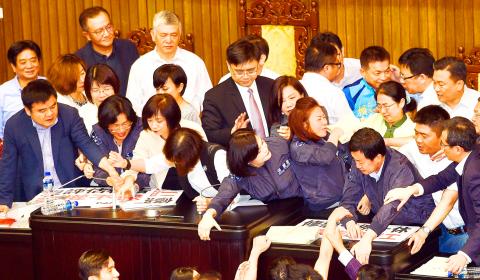The Cabinet’s draft amendment to the Labor Standards Act (勞動基準法) yesterday proceeded to committee reviews, despite protests by the Chinese Nationalist Party (KMT) legislative caucus.
Scuffles broke out in the legislative chamber in Taipei early yesterday when Democratic Progressive Party (DPP) legislators began dragging their KMT colleagues away from the speaker’s podium, which they had occupied ahead of a first session to review the amendments.
KMT legislators Chiang Wan-an (蔣萬安) and Lin Wei-chou (林為洲) spearheaded the boycott, leading several other KMT legislators in shouting the slogan: “No report, no committee reviews.”

Photo: Peter Lo, Taipei Times
They were referring to assessments of the needs of different industries, which they said the Ministry of Labor should have conducted before the Executive Yuan approved the proposed amendment to the act.
The DPP’s heavy-handed approach to the draft amendment showed that it had not learned its lesson after it pushed through initial amendments to the act 11 months ago, Lin said.
He asked whether the DPP intends to change the act again if the new rules spark a backlash among workers or if they prove to be counterproductive to some industries.
The so-called “four flexible measures” in the amendment were designed to benefit employers, Lin said, adding that he could not believe the ministry had the audacity to say that there would be no changes to workers’ rights if the amendment is passed.
“How could workers’ rights remain unchanged when the rule mandating one day off after six days is to be changed to two days off after 12 days and the monthly overtime quota is to be raised from 46 to 54 hours?” Lin asked.
“None of the five draft regulations proposed by the Cabinet will benefit workers,” Chiang said, accusing Premier William Lai (賴清德), who approved the draft amendment, of “lacking empathy.”
The KMT legislators were vastly outnumbered after DPP legislators, who hold the legislative majority, entered the chamber.
DPP Legislator Su Chen-ching (蘇震清) and several others removed Lin from the podium, while DPP Legislator Chung Chia-pin (鍾佳濱) became entangled with Chiang and managed to edge him off the podium.
Chiang made several attempts to climb back onto the podium, which were foiled by DPP legislators, who were at that point in control of the situation, prompting Chiang to shout: “You are all members of the Capitalist Progressive Party.”
Legislative Speaker Su Jia-chyuan (蘇嘉全) appeared unfazed while presiding over the session, during which all motions tendered by the KMT to return the draft amendment to the Procedure Committee for further deliberation were voted down.
The draft amendment advanced to committee reviews in its entirety.
In other developments, the legislature approved the Executive Yuan’s nomination of National Central University law professor Chen In-chin (陳英鈐) as the new Central Election Commission (CEC) chairman.
Makeshift polling stations were set up in the legislative chamber in the afternoon for legislators to exercise their right of investiture.
Among the 72 legislators who cast ballots, 70 were in favor of the appointment, while two cast spoiled votes.
Nominee CEC deputy chairman Chen Chao-chien (陳朝建), and nominee CEC members Chou Chih-hung (周志宏), Tsai Chia-hung (蔡佳泓), Hsu Hui-feng (許惠峰) and Lin Chiung-chu (林瓊珠) were also approved.

AGING: As of last month, people aged 65 or older accounted for 20.06 percent of the total population and the number of couples who got married fell by 18,685 from 2024 Taiwan has surpassed South Korea as the country least willing to have children, with an annual crude birthrate of 4.62 per 1,000 people, Ministry of the Interior data showed yesterday. The nation was previously ranked the second-lowest country in terms of total fertility rate, or the average number of children a woman has in her lifetime. However, South Korea’s fertility rate began to recover from 2023, with total fertility rate rising from 0.72 and estimated to reach 0.82 to 0.85 by last year, and the crude birthrate projected at 6.7 per 1,000 people. Japan’s crude birthrate was projected to fall below six,

Conflict with Taiwan could leave China with “massive economic disruption, catastrophic military losses, significant social unrest, and devastating sanctions,” a US think tank said in a report released on Monday. The German Marshall Fund released a report titled If China Attacks Taiwan: The Consequences for China of “Minor Conflict” and “Major War” Scenarios. The report details the “massive” economic, military, social and international costs to China in the event of a minor conflict or major war with Taiwan, estimating that the Chinese People’s Liberation Army (PLA) could sustain losses of more than half of its active-duty ground forces, including 100,000 troops. Understanding Chinese

SELF-DEFENSE: Tokyo has accelerated its spending goal and its defense minister said the nation needs to discuss whether it should develop nuclear-powered submarines China is ramping up objections to what it sees as Japan’s desire to acquire nuclear weapons, despite Tokyo’s longstanding renunciation of such arms, deepening another fissure in the two neighbors’ increasingly tense ties. In what appears to be a concerted effort, China’s foreign and defense ministries issued statements on Thursday condemning alleged remilitarism efforts by Tokyo. The remarks came as two of the country’s top think tanks jointly issued a 29-page report framing actions by “right-wing forces” in Japan as posing a “serious threat” to world peace. While that report did not define “right-wing forces,” the Chinese Ministry of Foreign Affairs was

US President Donald Trump in an interview with the New York Times published on Thursday said that “it’s up to” Chinese President Xi Jinping (習近平) what China does on Taiwan, but that he would be “very unhappy” with a change in the “status quo.” “He [Xi] considers it to be a part of China, and that’s up to him what he’s going to be doing, but I’ve expressed to him that I would be very unhappy if he did that, and I don’t think he’ll do that. I hope he doesn’t do that,” Trump said. Trump made the comments in the context